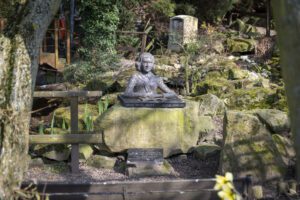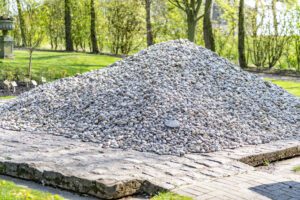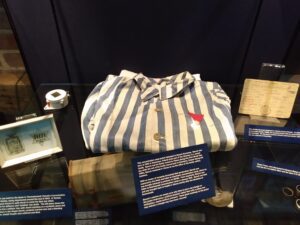A place for remembrance and testimony – The National Holocaust Centre and Museum
 The National Holocaust Centre and Museum is a unique place, offering an unforgettable experience where visitors can learn, reflect, and remember.
The National Holocaust Centre and Museum is a unique place, offering an unforgettable experience where visitors can learn, reflect, and remember.
Its buildings and vibrant gardens keep alive the voices of the victims of the Holocaust through engaging, thoughtful exhibitions and events for all ages and communities. Located by tranquil farming land near Sherwood Forest, it is the first centre dedicated exclusively to the teaching and remembrance of the Holocaust in England.
The Holocaust, or Shoah, was the genocide of Europe’s Jewish populations by Nazi Germany and its collaborators. Between 1933 and 1945, approximately six million Jewish people were systematically murdered through shootings, pogroms, and labour, concentration, or extermination camps.
The purpose of the National Holocaust Centre and Museum is to educate visitors about the Shoah, to raise awareness in schools, and to prevent anything similar happening again.
But one question lingers: why is this unique centre located in the middle of the Nottinghamshire countryside?
The answer lies with two brothers. Following a trip to Yad Vashem – Israel’s national Holocaust Remembrance Centre – James and Stephen Smith realised that there was no learning centre dedicated to the teaching of the Holocaust in the UK. Determined to ensure its victims did not fade from national memory, the Smith brothers began the monumental task of establishing a site for remembrance in their parents’ farmhouse, nestled between the fields of Laxton, in rural Nottinghamshire.
Today, the centre comprises several components, all with the goal of aiding visitors in understanding the horrors that took place more than seven decades ago.
 The memorial gardens are home to sculptures created by artists from across Europe, many of them being personally impacted by the trauma of the Shoah. Explore and encounter tributes from the haunting ‘emerging man’, to the Children’s Memorial. Here visitors can contribute a stone to the memorial, in keeping with ancient Jewish tradition. Nearby, a beautiful rose garden is brimming with a thousand white roses, each dedicated to an individual who was imprisoned in the camps.
The memorial gardens are home to sculptures created by artists from across Europe, many of them being personally impacted by the trauma of the Shoah. Explore and encounter tributes from the haunting ‘emerging man’, to the Children’s Memorial. Here visitors can contribute a stone to the memorial, in keeping with ancient Jewish tradition. Nearby, a beautiful rose garden is brimming with a thousand white roses, each dedicated to an individual who was imprisoned in the camps.
Inside the centre visitors can experience two exhibitions: ‘The Journey’ and ‘The Holocaust Gallery’. The former traces the footsteps of Leo, a Jewish boy who was evacuated from Nazi Germany on the Kindertransport. This interactive gallery brings to life extracts from his diary, read to you across immersive exhibitions charting how his family suffered under state oppression, Kristallnacht, and Leo’s life-changing train journey away from home.
‘The Holocaust Gallery’ explores the wider experience of Jewish people in Europe, from medieval times to the twentieth century. It delves into the brutal realities of anti-Semitism, the ‘Final Solution’ and life in the camps. It also details the brave ways in which prisoners resisted the camp system, before retelling the story of the post-war experiences of its survivors.
Finally, an auditorium provides space for visitors to watch a short film on the creation of the centre. It also hosts poignant talks from Holocaust survivors on their personal experiences.
 The impact of the centre has been widespread. Those touched by it include Rwanda’s Minister of Culture, who asked the sister charity of the museum – Aegis Trust – to help realise his vision of the Kigali Memorial Centre to the victims of Rwanda’s 1994 genocide. More recently, the UK government has confirmed plans for a Holocaust Memorial to be constructed in Victoria Tower Gardens in London.
The impact of the centre has been widespread. Those touched by it include Rwanda’s Minister of Culture, who asked the sister charity of the museum – Aegis Trust – to help realise his vision of the Kigali Memorial Centre to the victims of Rwanda’s 1994 genocide. More recently, the UK government has confirmed plans for a Holocaust Memorial to be constructed in Victoria Tower Gardens in London.
Seven decades have passed since the Shoah, and the number of survivors is decreasing while the risk of their stories being lost is increasing. If this were to happen, we would lose touch with the human stories caught within the tragedy, not only their pain but also their strength.
The centre performs essential work keeping alive the testimonies of those who experienced the horrors of the Holocaust. It provides a platform for the Shoah to be taught and reflected on peacefully and respectfully, restoring the voices that tyranny and hatred tried to silence.
The museum is open Sunday – Friday, 10am-4:30pm, with last admission at 3:30pm. Visitors are advised to book tickets in advance. A café is also available where customers may sit inside or outside.
To discover more, please visit https://www.holocaust.org.uk/
To arrange your visit, and for ticket prices, go to: https://www.holocaust.org.uk/FAQs/book-your-visit or email [email protected]
The centre has also created The Journey, a learning app for KS2 students. To access this, follow: https://journey.holocaust.org.uk/
Guest written by Will Parkinson, Economic Growth Officer, with thanks to the National Holocaust Centre and Museum.
